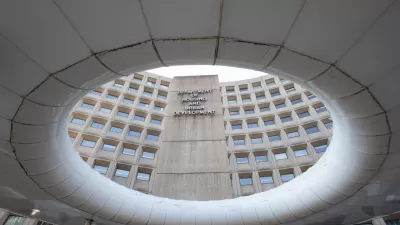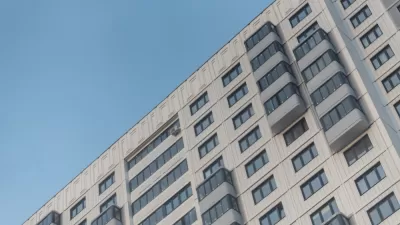A new rule proposed by the U.S. Department of Housing and Urban Development raises the burden of proof in cases of disparate impact, and provides additional defenses for defendants.

The U.S. Department of Housing and Urban Development published a new rule [pdf] regarding the disparate impact standards of the Fair Housing Act, following through on promises that date back to earlier times in the administration.
The news of the proposed rule, published on the Federal Register this Monday, was first reported by Katy O'Donnell for Politico at the end of July. Additional analysis by Lola Fadulu followed for the New York Times.
The day before the rule was published, Kriston Capps details the substance of the proposed rule for CityLab.
"The proposed regulation from the U.S. Department of Housing and Urban Development would replace an Obama-era rule on disparate impact, a legal theory that has guided fair housing law for more than 50 years," writes Capps.
The new rule "would substantially raise the burden of proof for parties claiming discrimination" and also "[carve] out an unprecedented guidance for the automated decision-making systems that power the housing market. "
The article by Capps includes more details on how the new rule would change the proceedings in disparate impact cases, both on the part of plaintiffs and defendants.
As noted by Capps, the new rule is the first federal regulation "to directly address algorithms and disparate impact." That component of the new rule is the subject of more analysis written this week by Emily Badger for the New York Times.
According to Badger's article, the disparate impact controversy applies to more examples than housing: "Industry groups and conservative legal advocates have long warned that any landlord, company or city official could be accused of discrimination simply if data shows racial patterns that exist for reasons beyond their control."
"If disparate impact becomes a less viable legal tool, civil rights groups counter that it will be almost impossible to curb policies and decisions that reinforce segregation and widen the racial wealth gap. If plaintiffs must prove that someone, somewhere, explicitly intended to discriminate, they’ll never be able to police city officials who keep that intent silent — or algorithms that have no 'intent' at all," adds Badger to present the reasons why fair housing advocates are concerned about the proposed rule.
The new rule entered a 60-day comment period when it was published on Monday.
FULL STORY: How HUD Could Dismantle a Pillar of Civil Rights Law

Alabama: Trump Terminates Settlements for Black Communities Harmed By Raw Sewage
Trump deemed the landmark civil rights agreement “illegal DEI and environmental justice policy.”

Study: Maui’s Plan to Convert Vacation Rentals to Long-Term Housing Could Cause Nearly $1 Billion Economic Loss
The plan would reduce visitor accommodation by 25% resulting in 1,900 jobs lost.

Planetizen Federal Action Tracker
A weekly monitor of how Trump’s orders and actions are impacting planners and planning in America.

Waymo Gets Permission to Map SF’s Market Street
If allowed to operate on the traffic-restricted street, Waymo’s autonomous taxis would have a leg up over ride-hailing competitors — and counter the city’s efforts to grow bike and pedestrian on the thoroughfare.

Parklet Symposium Highlights the Success of Shared Spaces
Parklets got a boost during the Covid-19 pandemic, when the concept was translated to outdoor dining programs that offered restaurants a lifeline during the shutdown.

Federal Homelessness Agency Places Entire Staff on Leave
The U.S. Interagency Council on Homelessness is the only federal agency dedicated to preventing and ending homelessness.
Urban Design for Planners 1: Software Tools
This six-course series explores essential urban design concepts using open source software and equips planners with the tools they need to participate fully in the urban design process.
Planning for Universal Design
Learn the tools for implementing Universal Design in planning regulations.
Caltrans
Smith Gee Studio
Institute for Housing and Urban Development Studies (IHS)
City of Grandview
Harvard GSD Executive Education
Toledo-Lucas County Plan Commissions
Salt Lake City
NYU Wagner Graduate School of Public Service





























